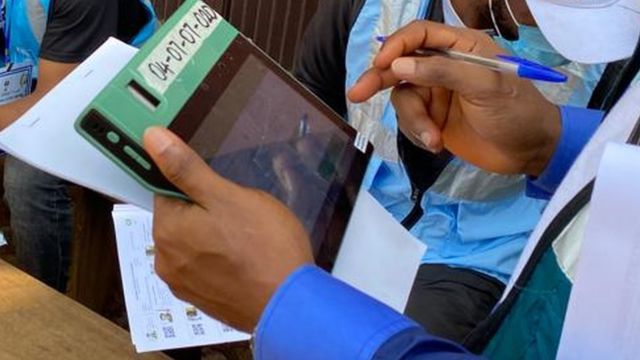Officials of the Independent National Electoral Commission (INEC), at many polling stations in Lagos State defied the directive from the Commission on how to transmit the results. Lots of viral videos making the rounds show some officials announcing to voters that they will not upload the results, amid protests by voters. It could be recalled that Mr. Festus Okoye National Commissioner at the INEC had yesterday explained how the commission would make the results of the March 18 governorship and the house of assembly elections available on its result-viewing portal. Okoye said this in response to the controversy trailing the commission’s performance in the February 25 elections.
The Voter Education Committee Chairman, who said the commission had learned “valuable lessons from previous elections that we conducted,” gave this explanation while appearing on Arise TV on Friday.
Okoye was quoted saying, “The law as of today prescribes a dual mode of either transmission of results or transfer of results.”
He stated that the process of transmission is systematic in that a presiding officer, after the close of voting, would record the figures received by parties on form EC8A, sign it and allow party agents to countersign the same before upload.
Okoye added that accreditation data resulting from the results would be uploaded alongside the result sheets, and election officials would then move to the registration area for the collation officer to see for himself the original result sheet.
He said, “The PO will sign that particular result sheet and stamp it. The PU agent or party agent, if available, will also countersign, and copies will be given to them and the police.
“That original result will be what will be scanned and uploaded to our INEC Result-Viewing Portal for public viewing. Not only that, the accreditation data that has arisen from that polling unit will also be uploaded, but the physical result and the BVAS itself will also be taken to the registration area collation centre.
“The commission is determined to improve on its previous performance. What we have done is to learn valuable lessons from previous elections that we conducted, and we’re going to put those lessons into our planning purposes and processes, and into our deployment purposes.
“As of today, what we’re having is what we call state assembly and governorship elections.
“In all the states of the federation, both the Bimodal Voter Accreditation System machines and all the sensitive election materials have left the Central Bank and the various state offices of the federation.
“We want to ensure that all polling units open on time. Secondly, we made sure that we reconfigured all the BVAS that would be used for this particular election in terms of making sure that the BVAS perform optimally and also making sure that some of the challenges we had in the previous elections do not reoccur.


